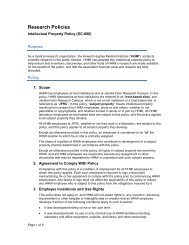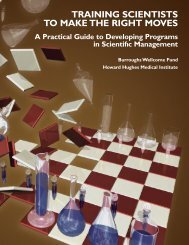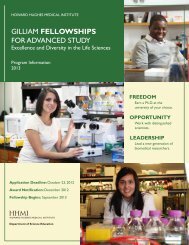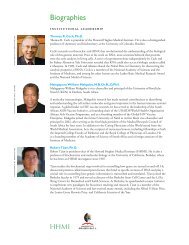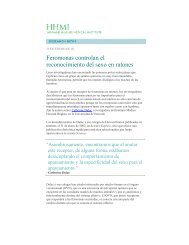Writing a Letter of Recommendation - Howard Hughes Medical ...
Writing a Letter of Recommendation - Howard Hughes Medical ...
Writing a Letter of Recommendation - Howard Hughes Medical ...
You also want an ePaper? Increase the reach of your titles
YUMPU automatically turns print PDFs into web optimized ePapers that Google loves.
<strong>Writing</strong> a <strong>Letter</strong> <strong>of</strong> <strong>Recommendation</strong><br />
Terms like “room for improvement,” “has worked hard to,” and “made great<br />
progress in” are useful and help turn a negative into a positive.<br />
WHAT THE LETTER SHOULD NOT SAY<br />
Avoid Irrelevant Information<br />
<strong>Letter</strong>s should not mention anything that is irrelevant to doing the job, such<br />
as ethnicity, age, hobbies, marital status, and so on. A writer might want to say<br />
things like “candidate x understands how important it is to have a lab team that<br />
functions well and has organized several social events for the lab that have helped<br />
make it both productive and happy” to show that the person is social and easy to<br />
get along with. That is something that might be important to the job. In some<br />
cases, personal information may illustrate the ability to persevere and overcome<br />
adversity, qualities that are helpful in research.<br />
But statements like “candidate x is very religious and has demonstrated religious<br />
fervor uncommon for someone his age” has no bearing on whether someone will<br />
do well in graduate school or in a job.<br />
Personal information may be revealed if it helps explain a weakness in someone’s<br />
application. For example, sometimes there are acceptable circumstances for a gap<br />
in someone’s publication record—perhaps a medical condition or a family situation<br />
kept that person out <strong>of</strong> the lab for a period <strong>of</strong> time. It is okay to explain that<br />
in the letter <strong>of</strong> recommendation but only after discussing it with the candidate.<br />
Another example <strong>of</strong> a personal situation that might warrant discussion would<br />
be a case in which a postdoc is not able to ask his or her advisor for a letter <strong>of</strong><br />
recommendation because <strong>of</strong> a bad relationship. If you, as the letter writer, know<br />
about this situation, you might want to mention in the letter that “there was a<br />
personality conflict but it does not reflect on the ability <strong>of</strong> the candidate to do<br />
the job.”<br />
Don’t Say Anything That Is Not True<br />
Obviously, all information in a letter <strong>of</strong> recommendation should be, to the best<br />
<strong>of</strong> your knowledge, accurate. But sometimes letter writers stretch the truth to<br />
make a candidate sound better than he or she really is, thinking it is helpful.<br />
This strategy can backfire. According to a member <strong>of</strong> a recent search committee,<br />
the head <strong>of</strong> one lab wrote letters for three applicants from his lab, and in each<br />
letter he stated that the applicant was “the best postdoc ever in my lab.” Most<br />
researchers say that the most effective letters they receive include some weakness<br />
to balance the strengths.<br />
BWF ♦ HHMI 7




